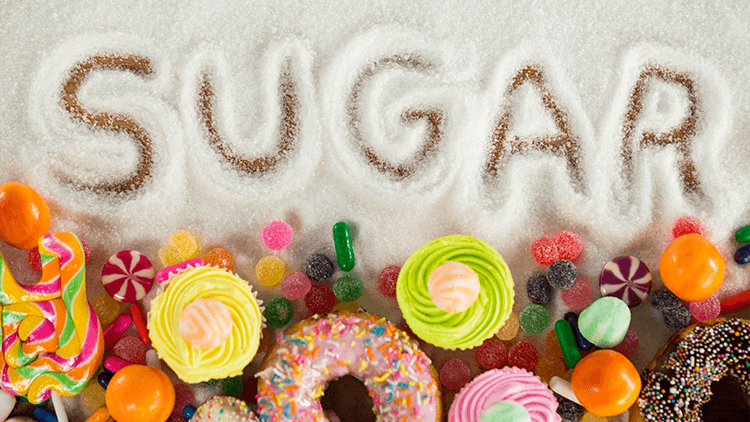
Why is Sugar Bad For You? And How Can You Reduce The Sugar in Your Diet?
- Introduction
- Is sugar bad for you?
- How to cut back on sugar
- How to reduce sugar cravings
- What happens when you cut back on sugar?
Introduction
Sugar is one of those foods that if you have it in excess it can be harmful to your body. Yet how is sugar bad for you? What makes it so dangerous?
Similarly, what happens when you cut back on sugar? What impact will it have on your body?
In this article, we shall explore how to cut back on sugar, reduce your sugar cravings and make easy adjustments to your diet.
Is sugar bad for you?
The problem with sugar is that it is very calorie-dense, meaning it doesn’t take a lot of sugar to ramp up your calorie intake. Now, this doesn’t mean sugar calories are more fattening. No. What we mean is, that anything that contains added sugar e.g. soft drinks, has the power to trigger weight gain if you have it in excess.
Then of course there is the fact that sugar has no nutritional value and as such tends to displace more nutritious foods from your diet. This results in you either excluding these nutritional foods from your meals (reducing the nutritional value of what you eat) or you overeating because you’re having both.
Truthfully, weight gain is a real possibility in either situation because as well as having no nutritional value, sugary foods will leave you feeling unsatisfied. And should that occur, this will encourage you to eat more to fill this void.
Other non-helpful things about sugar:
- When you eat sugary foods – i.e. cookies or cake – your hormones normally send signals saying that you’ve eaten something. This doesn’t happen with sodas, meaning you’re likely to drink more and eat in order to compensate for this empty feeling.
- All types of sugars will increase the amount of fats/bad triglycerides in your blood.
- Processed sugars can – reduce the presence of good cholesterol; elevate your blood pressure; trigger inflammation; increase your risk of heart disease, diabetes and certain types of cancer, and are leading contributors to obesity.
Do all sugars behave the same?
There are actually some big differences between the two:
-
-
Natural Sugar – these occur naturally within fruit (fructose) and dairy products (lactose – milk and cheese), so aren’t as damaging to your body. In fact, natural sugar is good for preventing cancer and other diseases as it can provide you with essential nutrients that will keep you healthy. For instance:
- Milk also contains protein and fiber that can help you to feel fuller for longer.
- The fiber in fruit can help to slow down your metabolism and make you feel full (by expanding in your gut). This can help to suppress your appetite. Fruits are also rich in antioxidants which can reduce your risk of cancer.
- It has little to no effect on your blood sugar levels.
- It is considered relatively healthy (in moderation).
- Added/processed sugars – these simple sugars can be found in sweet foods, beverages, baked goods, desserts, candy, juice and soft drinks, and comprise of 1-2 molecules that are converted into blood glucose faster than complex carbs (whole grains and veg). Now, these typically come in two forms: refined sugar (which is extracted from sugar or sugar beets to help sweeten cakes, coffee, cereal etc.) and chemically produced sugar (high-fructose corn syrup – which is added to foods and drinks).
-
Natural Sugar – these occur naturally within fruit (fructose) and dairy products (lactose – milk and cheese), so aren’t as damaging to your body. In fact, natural sugar is good for preventing cancer and other diseases as it can provide you with essential nutrients that will keep you healthy. For instance:
These sugars:
-
-
- Offer little nutritional value
- Are rapidly broken down rapidly causing your insulin and blood sugar levels to skyrocket.
- Are digested quickly, so you don’t feel full after eating.
- Increase rates of obesity and the risk of certain cancers: breast, prostate, pancreatic, etc.
-
NOTE: once sugar reaches your small intestine, it doesn’t matter where it came from as they’ll both behave the same way. You see, the amount already in your blood will affect how it is used, meaning if you’ve already got a lot in your system it will either form fat or glycogen (stored form of glucose).
So are all sugars bad? Natural sugars – not so much. But this is dependent on how much you eat. Eat too much and even natural sugars can harm your body.
How to cut back on sugar
Given that the average American consumes 17tsp/68g of added sugar every day – 11tsp more than is recommended for women and 8tsp more than is advised for men – learning how to cut back on your sugar intake is important.
Luckily, we have got you covered. Each of the following tips can show you how to successfully cut back on carbs and sugar, and potentially lose weight:
-
- Cut out sugary drinks, beverages and energy/sports drinks
– simple, right? Yet it requires a conscious effort to say no as all of these are laden with sugar that offer your body no nutritional benefits.
FACT: sodas, sports drinks and fruit drinks make up 44% of the added sugar in American diets.
FACT: 450ml of 100% apple juice contains 12tsp/49g of sugar.
To get started we suggest cutting the amount of sugary drinks you have in half, before moving towards healthier options i.e. drinking water. NOTE: it is okay to have the occasional sugary drink BUT not all the time.
Alternatively you can try drinking: sparkling water with a squeeze of lemon; water with mint and cucumber, and herbal/fruit teas or tea or coffee (without adding sugar).
-
- Avoid processed desserts
– would you believe that cakes, cookies, pies, doughnuts, ice cream and pastries account for 18% of the added sugar consumed by Americans? It’s true. And because they are loaded with sugar they will cause your blood sugar to soar before causing you to crash and feel tired, hungry and wanting more sugar.
For this reason, switch to real fruit based snacks that will cover this sugar craving whilst offering you vitamins and minerals. Alternatively, you can have plain old fresh fruit, Greek yogurt, dark chocolate or a handful of dates. Not only are these sweet but they’ll offer you plenty of fiber, vitamins, minerals and antioxidants.
-
- Say no to sugary breakfast cereals
– like a lot of sugary foods, breakfast cereals can trigger a sugar rush before causing a slump and a craving for more sugar throughout the day.
FACT: popular cereal brands contain half their weight in added sugar.
FACT: Some cereals contain 12tsp of sugar per serving making 88% of its weight added sugar.
Instead, opt for oats as these are filling and can be served in a variety of ways. Alternatively you can try having Greek yogurt, eggs (boiled, poached or scrambled) or avocado.
-
- Avoid sauces filled with sugar
– ketchup, barbecue sauce, sweet chili sauce and a number of jarred sauces are all overflowing in sugar. Just 1tbsp of ketchup contains 1tsp of sugar.
For this reason, where possible try to make your own sauces or try flavoring your food with fresh/dried herbs and spices; fresh chili, pesto, mayonnaise (be mindful with this one as it is high in fat) or harissa paste.
-
- Cut out chocolate
– similar to processed desserts, candy/sweets are high in sugar. Begin by cutting down the amount you eat and swapping them for sweet tasting, yet healthier options i.e. fruit or dark chocolate.
-
- Eat full-fat foods
– you’re probably thinking ‘why would I do that if I’m trying to lose weight? However, low-fat alternatives usually contain more sugar – as well as more calories – than their full-fat counterparts. A prime example of this is low fat yogurt. A 113g serving contains 4tsp of sugar, whilst full-fat plain yogurt contains only 1tsp (which is naturally occurring milk sugar).
This means that these low fat versions will negate your reasons for using them as their high sugar intake could cause you to gain weight.
-
- Always read the label
– before buying anything – and we mean ANYTHING – you should always check its label to see how much natural and added sugar it contains. Even unlikely foods may contain sugar e.g. breakfast cereals, bread (1.5tsp per 2 slices) and dried fruits. Canned foods regularly contain a lot of added sugar, so please read their labels carefully.
TIP: Avoid canned foods that use syrup or added sugar in their ingredients, and instead buy fruits that are canned in their own juice.
TIP 2: When it comes to identifying added sugars on a label, look out for the following and keep a note of where they appear on the list, as the higher up they are, the greater the percentage – High-fructose corn syrup, Cane sugar or juice, Maltose, Dextrose, Invert sugar, Rice syrup, Molasses and Caramel.
NOTE: not all labels will differentiate between natural sugars (from milk and fruit) and added sugar so you need to be mindful of their wording.
-
- Be wary of ‘healthy processed snack foods’
– these usually contain as much sugar, if not more, than chocolate and cookies. Granola bars for instance contain 8tsp of sugar.
For a real healthy snack consider having trail mix, a handful of nuts, a hard-boiled egg or fresh fruit.
-
- Eat more protein and fat
– given that a high sugar intake can elevate your appetite and cause weight gain e.g. fructose is believed to boost your appetite; it makes sense to eat more protein and fats to combat this effect.
Combine these 2 nutrients with a diet low in added sugar, and you can reduce your appetite and food intake. In fact, increased consumption of protein (by 25%) has been found to decrease cravings by 60%.
-
- Keep high sugar foods out of your house
– if they are not there, then you can’t eat them. Which is perfect when cravings hit. One study found that our internal clocks will increase hunger levels and cravings for sweet/starchy foods in the evening.
-
- Get plenty of sleep
– poor quality sleep has been connected to depression, lack of concentration and a decreased immune system. It has also been linked to obesity and cravings for particular foods.
According to one study they found that the frontal lobes of participants (which controls decision making) was negatively affected by loss of sleep, whilst the area of the brain which responds to rewards and desires was stimulated.
Combined this led to them favouring high calorie, sweet and salty foods (whilst sleep deprived).
Similarly, another study discovered that those who didn’t get a full night’s sleep (due to going to bed late) tended to eat more and favoured junk food/soda over fruit and veg.
For this reason, aim to go to bed earlier and get plenty of sleep.
How to reduce sugar cravings
Okay, we’ve talked about how to reduce sugar in your diet, but what about sugar cravings? What can you do to decrease these cravings?
The first thing you need to accept is that even if you have slept well; have hit the gym hard and have eaten healthy all day, sugar cravings can still come out of nowhere. This is because our bodies crave sugar as it acts as fuel for our brains. Plus it is highly addictive and is often seen by the brain as a reward, making it harder to resist.
Fortunately, we can show you how to cut back on your sugar intake and keep it to a minimum, as well as give you tips on how not to give in:
-
- Don’t let yourself get too hungry – cravings usually hit when our blood sugar levels get low and when our bodies are looking for an energy boost. To prevent these cravings from taking form – plan ahead, eat healthy meals and make sure you never get to the point where you’re too hungry.
- Keep alternatives on hand – sometimes these cravings can’t be avoided, so to prevent your diet from being derailed, try to keep something sweet on hand to snack on i.e. dried fruit (be careful with this snack option and make sure to measure out your serving as it is high in sugar. In moderation, it is okay to have).
- Incorporate whole foods into your main meals – these are an example of sweet, healthy foods which can keep your sweet tooth at bay. We suggest adding sweet potatoes, butternut squash and carrots to your meals as these will curb the craving without ruining your diet. Plus as they are high in fiber, you won’t get a sugar rush.
- Chew gum – this will serve as a great distraction from your cravings, as its minty taste will taint the taste of any food you eat for a good hour after you’ve had it (acting as a deterrent to your cravings as it will force you to wait – hopefully until your next meal).
- Eat at set, regular times – by creating a routine/schedule that is predictable e.g. eat every 3-5 hours, this will do more than curb your cravings; it will also ensure that your body runs efficiently and that your blood sugar levels remain stable.
- Use exercise to boost your serotonin levels – this hormone can boost feelings of happiness. Now, sweet treats aren’t the only way you can boost the release of this hormone. Exercise and a good night’s sleep can also help too.
- Drink more – often what we mistake for hunger is our body’s way of telling us we’re dehydrated. But that is not the only sign. Sugar cravings are also a sign of dehydration so the next time you feel them, grab yourself a glass of water. Alternatively, make sure to drink water regularly across the day.
- Munch on more greens – not only can they nourish your body, but green veg can help to reduce sugar cravings (including the desire for processed foods). This is due to their high complex carb content which is usually broken down by your body to create fuel. In doing so, you can enjoy healthy, consistent blood sugar levels plus you will be less inclined to experience sugar cravings.
TIP: Add leafy greens e.g. spinach or kale to smoothies or your meal.
- Indulge in sugary treats on occasion – let’s be honest. It would be next to impossible to resist sugar cravings forever. So if you’re going to cave and have some, we suggest you do it the right way e.g. pick something small that will satisfy your sweet tooth, so you won’t be tempted to eat all of it. Next, eat it slowly so you can fully appreciate its flavor/taste.
What happens when you cut back on sugar?

Remember how we said that sugar can be addictive? Well, sugar can affect your brain in a similar way to drugs, as it will produce cravings and a need to consume more each time in order to satisfy your cravings.
This is why you can’t go completely cold-turkey, as you run the risk of suffering from sugar withdrawal e.g. increased headaches, fatigue, anxiety and risk of depression.
Because of this we suggest that you reduce your sugar intake slowly and that you keep added sugar to a minimum so that your body has time to naturally adjust to this change. Do it too rapidly and there is a danger that you’ll binge on more sugar because you feel deprived.
Similarly, cut it out entirely and your body will crash as it will go from a sugar high to having none at all.
So what can be done?
- Adopt a moderation mentality and cut back sugar in stages: this will minimize symptoms of withdrawal and cravings, and will make this positive lifestyle change more sustainable.
By being sensible, this drop in sugar intake will help to lower your blood pressure and cholesterol as well as help to protect you from heart disease, diabetes and obesity.
10 Tips to Lose Weight and Keep It Off >>

Conclusion
So is sugar bad for you? Well it depends on the type of sugar you have – natural or processed. However, in both cases, if had in excess they can cause problems to your health, body and weight. That is why we strongly recommend that everyone learns how to cut back on sugar so that they don’t run the risk of health complications.
To keep the pounds at bay, protect yourself from heart disease, weight gain, high blood pressure, cholesterol problems and diabetes; by making the decision to change, you can take control of these cravings and not let them dictate your life.
PhenQ is another way to take charge of your body. By working to suppress your appetite and increase fat burn; PhenQ can act as an assistive tool that will effectively keep your cravings at bay.
For more advice on how to reduce sugar cravings, visit PhenQ’s website.




